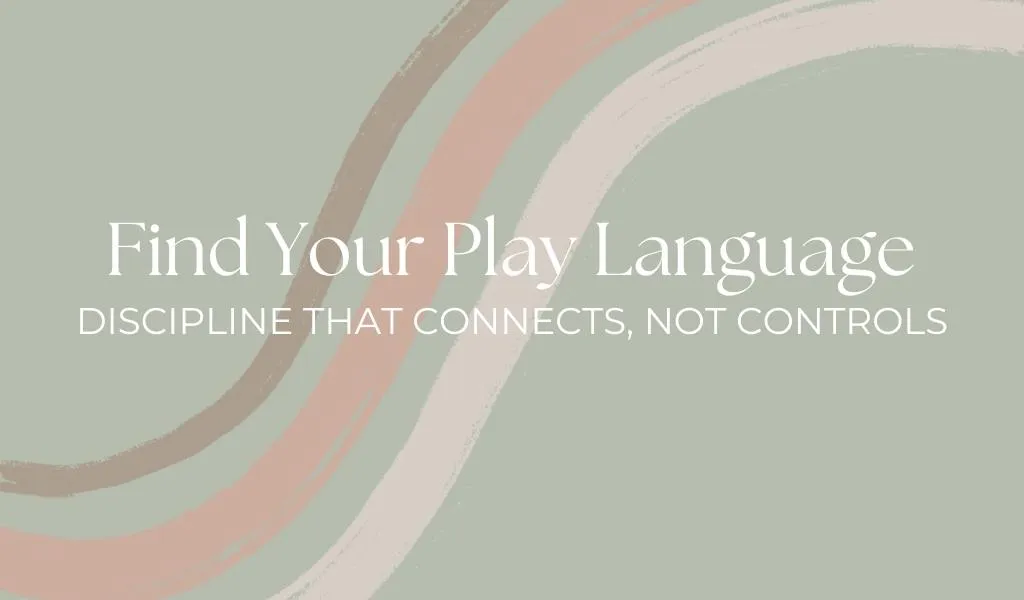
Find Your Play Language - Discipline That Connects, Not Controls

If discipline feels heavy, disconnected, or full of guilt, you’re not alone.
You may have always believed that discipline meant punishment, control, and compliance—not connection, joy, or play. So when we try to do things differently as parents, it’s easy to feel like we're not doing ENOUGH.
But there’s one powerful—and often overlooked—tool that changes everything:
Play.
Not just any play. Your kind of play.
Why Play Works : "Power With" not "Power Over"
In Parenting from the Inside Out, Dr. Dan Siegel and Mary Hartzell explain that children thrive when they feel safe, seen, and soothed. Their brains literally wire differently when they experience consistent, connected interactions—especially in emotionally charged moments.
Play is one of the fastest and most natural ways to:
Build trust and cooperation
Lower stress hormones
Invite your child’s brain into a receptive, learning-ready state
Strengthen the relationship you’re building—one interaction at a time
When a child is dysregulated this part of their brain is shut off. Through co-regulation you and your child can find peace. Play allows you to move your child into cooperation and for the learning center of their brain to turn back on! In this space, you can be connected while also teaching your child the replacement behaviors they need and room to role play what to do next time.
Power struggles only happen when you're both vying for control. This way empowers you both! You and your child get to work together and find solutions while laughing, connecting and loving each other in the process.
And here’s the bonus: play helps you too.
When you're able to access joy, humor, and creativity, you naturally regulate your own nervous system and interrupt the patterns of yelling, snapping, or shutting down.
But What If Play Feels Hard For You?
If you’ve ever sat on the floor and thought, I have no idea how to play with my child, you’re not broken.
You just haven’t discovered your play language yet.
Just like kids have different love languages, adults have unique ways we feel most authentic and alive in playful connection. Your play language might be:
Making up silly songs or voices
Telling funny stories or acting out scenes
Creating obstacle courses
Playing guessing games
Cooking together while joking around
Having tickle time or wrestling (if your child enjoys it)
Using playful “challenges” like, “Let’s see who can clean up fastest!”
If traditional play overwhelms or bores you, stop trying to do what you think play should look like—and start exploring what feels natural to you.
You Can't Play When You're in Survival Mode
Just like your child, being playful is nearly impossible if your nervous system is dysregulated.
You can't laugh when you're triggered.
You can't connect when you're consumed by shame.
You can't show up with curiosity when you're stuck in control mode.
That’s why I created the Rage Reset Mini Course—a quick, powerful tool that helps you:
Understand your reactivity (it’s not just about your child)
Regulate your body in real time
Repair your relationship with calm, not shame
Both The Mini Course and my workshop, “The 3 Secrets to Discipline Without Rage,”help you start unlocking a new way of parenting: one rooted in regulation, connection, and yes—even play. They are both linked below! ⬇️
💛 Discipline Without Rage Workshop
Discipline Doesn’t Have to Be Heavy
When you discover your play language, something shifts.
You stop trying so hard to get cooperation and start enjoying the moment.
You can turn boundaries into games.
Redirect misbehavior with laughter instead of lectures.
And meet your child in the kind of connection that softens resistance and deepens trust.
This isn’t permissive parenting. It’s relationship-based parenting—the kind that actually works long-term because it honors both the child’s nervous system and yours.
Want More Tools Like This?
If this blog spoke to you, we’d love to stay in touch.
📬 Join our email list below and get more practical, powerful tools to:
Stop yelling and start connecting
Understand your child’s behavior through brain science
Create a peaceful home without punishments or power struggles
We’ll send you real help, real stories, and real hope—straight to your inbox.
